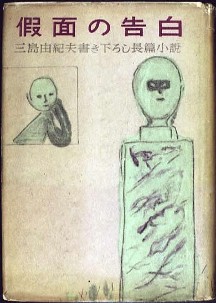Confessions of a Mask

First edition (Japanese)
|
|
| Author | Yukio Mishima |
|---|---|
| Original title | Kamen no Kokuhaku (假面の告白) |
| Translator | Meredith Weatherby |
| Country | Japan |
| Language | Japanese |
| Publisher | New Directions (US Eng. trans) |
|
Publication date
|
1949 |
|
Published in English
|
1958 |
| Media type | Print (Hardback & Paperback) |
| Pages | 254 p. |
| ISBN | |
| OCLC | 759934 |
Confessions of a Mask (仮面の告白 Kamen no Kokuhaku) is Japanese author Yukio Mishima's second novel. First published in 1949, it launched him to national fame though he was only in his early twenties.
The main protagonist is referred to in the story as Kochan. Being raised during Japan’s era of right-wing militarism and Imperialism, he struggles from a very early age to fit into society. Like Mishima, Kochan was born with a less-than-ideal body in terms of physical fitness and robustness, and throughout the first half of the book (which generally details Kochan’s childhood) struggles intensely to fit into Japanese society. Due to his weakness, Kochan is kept away from boys his own age as he is raised, and is thus not exposed to the norm. This is what likely led to his future fascinations and fantasies of death, violence, and sex. In this way of thinking, some have posited that Mishima is similar.
Kochan is homosexual, and in the context of Imperial Japan he struggles to keep it to himself. In the early portion of the novel, Kochan does not yet openly admit that he is attracted to men, but indeed professes that he admires masculinity and strength. Some have argued that this, too, is autobiographical of Mishima, himself having worked hard through a naturally weak body to become a superbly fit body builder and male model.
In the first chapter of the book, Kochan recalls a memory of a picture book from when he was four years old. Even at that young age, Kochan approached a single picture of a heroic-looking European knight on horseback almost as pornography, gazing at it longingly and hiding it away, embarrassed, when others come to see what he is doing. When his nurse tells him that the knight is actually Joan of Arc, Kochan, wanting the knight to be a paragon of manliness, is immediately and forever put off by the picture, annoyed that a woman would dress in man’s clothing.
The word ‘mask’ comes from how Kochan develops his own false personality that he uses to present himself to the world. Early on, as he develops a fascination with his friend Omi’s body during puberty, he believes that everybody around him is also hiding their true feelings from each other, everybody participating in a ‘reluctant masquerade’. As he grows up, he tries to fall in love with a girl named Sonoko, but is continuously tormented by his latent homosexual urges, and is unable to ever truly love her.
...
Wikipedia
